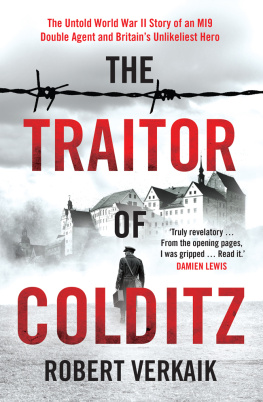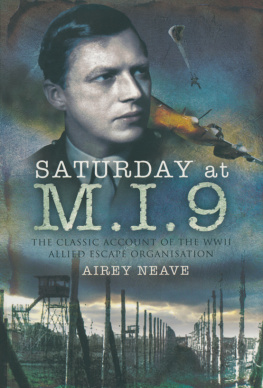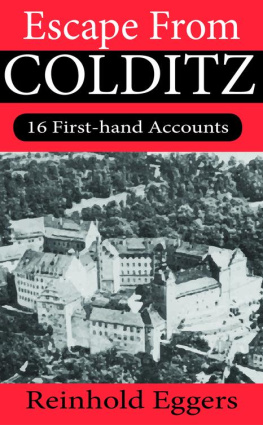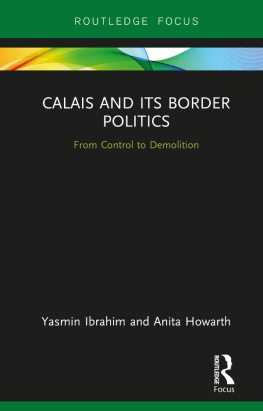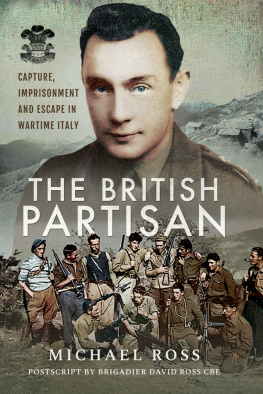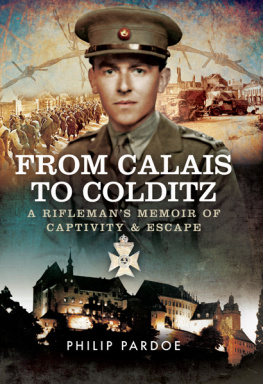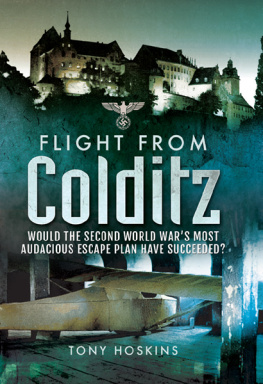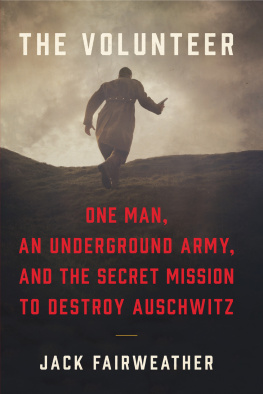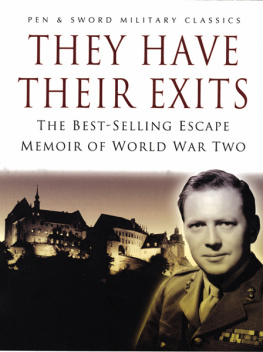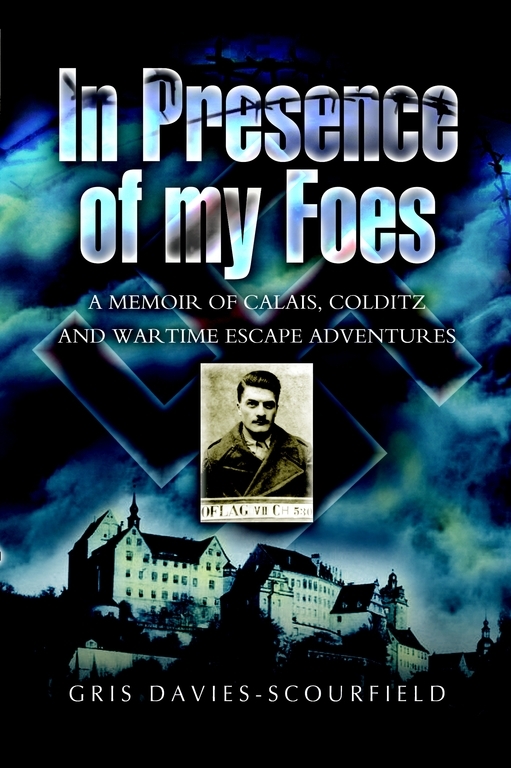I must first say a very big thank-you to my many friends, who have long been urging me to set down this tale of travels, travails, excitements, frustrations and disasters which made up my rather unusual adventures in the Second World War. Without their encouragement the tale would never have been told.
My thanks are also due to my old Colditz friend, Kenneth Lockwood, for supplying me with pictures and photographs of the castle, from which came Geoffrey Meads drawing and to Tana Riviere who drew for me the map, without which some of my wanderings would be meaningless to many of my readers.
I am most grateful to the following for allowing me to quote from other works: from The Colditz Story , (Hodder and Stoughton Ltd), and Mr S. H. R. Jeal the Executor of the estate of the author, the late Major Pat Reid; from The Flames of Calais by the late Airey Neave (republished by Pen and Sword Books, 2003); from Colditz Recaptured , edited by the late Reinhold Eggers, (Robert Hale Ltd); from Colditz the Full Story by the late Major P. R. Reid, (Macmillan, London Ltd); and from Tunnelling into Colditz , by Jim Rogers (Robert Hale Ltd).
I also want to thank the following for permission to use photographs from their books: Henry Chancellor and Hodder and Stoughton Ltd. ( Colditz The Definitive History ); Robert Hale Ltd. publishers of Reinhold Eggers Colditz The German Story and Colditz Recaptured ; and Jon Cooksey, author of Calais A Fight To The Finish, May 1940, Pen and Sword Books Ltd.
I am extremely grateful to my publishers, Pen and Sword Books Ltd., and in particular Brigadier Henry Wilson, who also served in the 60th, for all their help, advice and encouragement for their production of this book in its new form. My sincere thanks also go to the late Lord and to Lady Holderness for its initial publication through their firm Wilton 65.
Last, but by no means least indeed most of all, I thank my wife, Diana, whose idea it was in the first place that I should make the effort and who read and criticized (often severely but always constructively) my manuscript, then typed it all and, when I changed its form and scope, typed it all over again with never a word of complaint! For this, as in all things, my debt to her is incalculable.
Epilogue
As we grow older Time seems to quicken, and five years can pass just like an evening gone.
Certainly my five years spent as a prisoner of war sliced away a substantial part of my youth. When I was captured I was but twenty-one, just come of age. When I came home I was nearly twenty-seven.
They were for the most part wasted years, years eaten by the locust and gone for ever with the wind. They could not be reclaimed. Yet, on the credit side I had at least survived and learnt such things as patience, fortitude, some measure of resourcefulness and the ability to improvise and look after myself. Now, like so many others at that time, I would have to be picking up the pieces and starting all over again.
The family home, Annington, near Steyning in Sussex, seemed much the same, just the shrubs and trees in the garden grown bigger, and old Nanny Bridge, who had received my first prison postcard, the one I wrote from the hospital in Calais, was still there, waiting to welcome me back.
It took me some time, of course, to catch up on all the news of family and friends, and I was shocked to find how many of the latter had been killed. There was, however, one piece of exceptionally good news. As my mother drove me home from Shoreham station she told me that Mrs M had escaped from Poland and had arrived, miraculously and safely, in London. Within a week I had run her to earth and listened to her tales of adventure and escape. It was marvellous to see her safe and sound in England as she had always been in danger when I had known her before.
She wished to be known as Miss Jane Walker, with the MBE awarded her for her wartime work in Warsaw. She lived to a ripe old age and died in Bexhill (Breezy Bexhill, as she liked to call it) in 1963 at the age of eighty-six. I wrote her obituary in The Times and, to this day, my wife and I go annually to tend her grave. It is often raining when we go there and, if she ever watches, she will certainly be laughing at us. She had a great sense of fun.
I was able fairly quickly to find out about my old platoon from Calais. Nine of them, less than I feared, had been killed, including Sergeant Wall, Corporal Gorringe and Lance Corporal Smith. Three had been seriously wounded early in the battle and been successfully evacuated home. The remainder, of whom a number had been wounded, were taken prisoner. My faithful batman, Smith, had survived and we met again in London.
At first, I was none too well and was even suspected (wrongly, I am glad to say) of having TB. But I was soon busily involved with the formation of David Stirlings new SAS regiment, though the atom bombs and Japans subsequent surrender put paid to that.
I have never managed to learn very much about the fate of my brave Polish friends, partly because Poland was behind the Iron Curtain and party because, with a few exceptions, I had never been told their real names. Most of what I did discover only came gradually to light. I believe Mr Olszewski (my dear Puffy) was killed or died in a concentration camp and that several of the resistance groups, including those in Posen, Lodz and Warsaw suffered casualties and were broken up.
In 1951, however, when I was soldiering in Germany I discovered that the Kotyllas were living in a West German Displaced Persons camp. Diana and I visited them there and I was able to recommend them to our Control Commission as suitable people for immigration into Britain or the USA.
Charles Whitehead, or Karol as we knew him, who had helped us so much in Warsaw and, in whose empty flat, I had resided while in the care of Mr R was arrested by the Russians; it was something to do with his mothers chocolate firm which had been taken over by the Germans during the war. Despite strong British protests he was imprisoned for eight years but managed to survive.
Many years later I made contact with a Mrs Lutostanska, whose husbands family had sheltered me during the war and, with the help of one Josef Hlebovicz, who had been a Polish officer in Colditz with me, I also contacted Charles Whitehead, Mr R and one Zygmunt Klichowski, who, as a boy, had been the link between the Posen camp and the local Resistance. Zygmunt had been imprisoned by the Germans but had survived to become a Colonel in the Polish Airforce.
During a visit to Poland in 1991 I was able to meet up with John and Lucy Lutostanski, Zygmunt and his wife Janeczka, and with Karol Whitehead, but unfortunately Mr R, now over ninety, was unable to see me. Karol and I had much to talk about and, before saying goodbye, I stood with him for a few moments on the great bridge across the Vistula near Saska Kepa at the exact spot where I had stood on the old bridge (destroyed in the war) feeling lonely and very far from home, one evening long ago.
I had hoped my visit would give me an opportunity to repay in some small way the wartime hospitality I had received. I was not allowed to do so. Once again Polish hospitality overwhelmed me. The old song of my prep school days came back into my mind.
In Poland stands an inn,
In Poland stands an inn,
In Poland stands a Polish inn
And there the people all go in,
For nothing all their food they win,
They do not pay a pin.
Within three months of my return to England in 1945 I became heavily involved in courting, slightly inhibited by my intendeds sensible caution while the war was still going on. Then came the atom bombs, and suddenly it was Peace. I was staying at the time with my eldest brother and his wife at Esher. Learning of Japans impending surrender, I rang Her-who-had-become-the-light-of-my-life, making use of an A, D and C call ( Advise, Duration and Cost ) and explained that the new situation had removed all barriers to our immediate engagement. Encountering what I considered to be some regrettable lack of spontaneous enthusiasm at the other end of the line, I expounded my case with gusto and passion. It took me three-quarters of an hour to settle matters satisfactorily.


